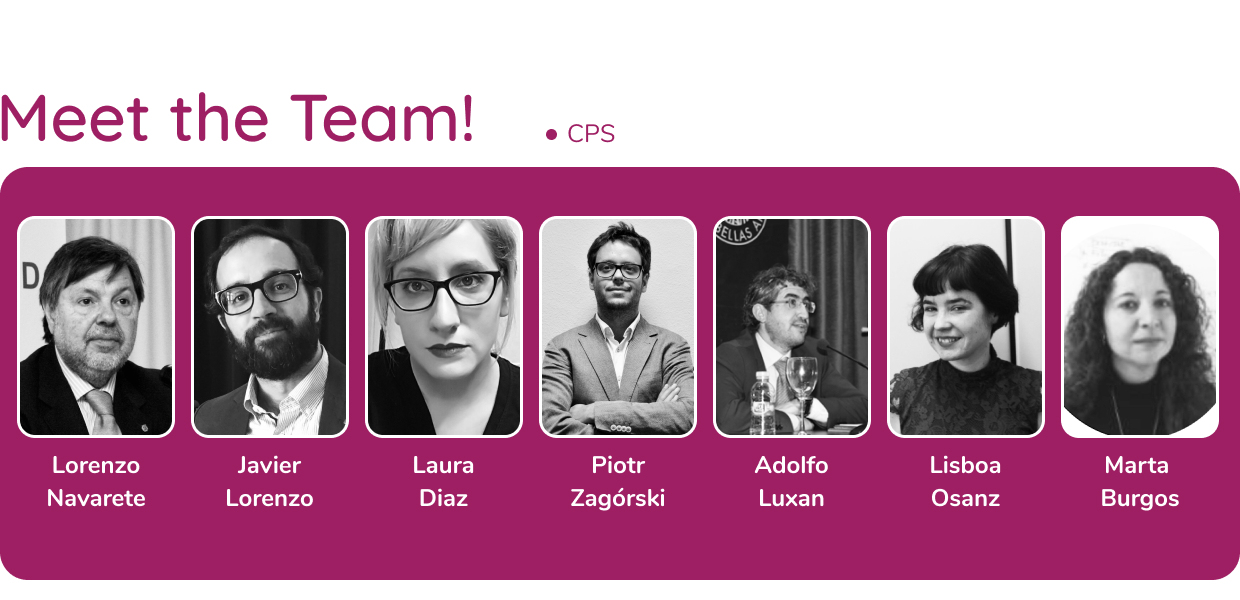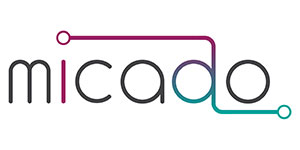
04 Jan Meet the Team – CPS
The Professional Association of Sociologists and Political Scientists (CPS), is a non-profit, research and education institution regulated by public law. Its main objectives are to support the development of the profession of sociologists and political scientists, to analyse and research political and social issues, and to provide expert consultancy to public entities.
Its Research Department has been working for the last 20 years with the support of University researchers, technical personnel and students, with transdisciplinary expertise in Sociology, Political Science, Social Psychology, Social Research Methodology, Applied Social Research and Data Analysis. CPS research focuses mainly on Public policies, Youth Studies, Migration and ICTs, with experience in European (H2020 MICADO, H2020, MOVE, Erasmus+ Youth Wiki, etc.), national, regional, and local projects. We have a vast experience designing, and implementing surveys, online surveys, qualitative interviews and case studies, focus groups, secondary data, statistical data analysis, and social media analysis. CPS possess a longstanding history of collaboration with relevant national and local/regional public institutions, policy-makers sucha as the Monitoring Commission of the Refugee Service of the Community of Madrid, the RC GIRA (Immigration, Refugee and Asylum Group), or Intelligent Territories of Subcommittee 6 Government and Public Services 4.0 of the Ministry of Energy, Tourism and Digital Agenda.
Firstly, tell us a bit about the work you do in your organisation.
Lorenzo Navarete: I am the Dean of the Professional Association of Sociologists and Political Sciences and Head of the Research Department. I have worked the last 30 years on the Board of the institution, a position I combined with my work as Professor of Classical Social Theory and Head of the Department of Sociology V at Complutense University.
Javier Lorenzo: I am a Senior Researcher in the Research Department, acting as an external advisor or expert, helping to develop methodologies and enhance young research professionals’ careers.
Laura Diaz: I work as researcher and EU projects coordinator at CPS. I work in the social research aspect of the project, having contributed to set the social science fundaments of MICADO through the review of literature, collection of indicators and review of public policies. I also work on the management side of the project, having been involved in the proposal and early stages of MICADO.
Piotr Zagórski: I am a Researcher at CPS. My duties include collaboration in European and national research projects in the field of social sciences. This involves the compilation of literature reviews, theoretical frameworks, data gathering and analysis, preparation of deliverables and reports, and putting up proposals for research calls.
Adolfo Luxan: I work at CPS in the design and in the implementation of several projects (research projects, training courses, projects related to employment) I also work as Employment Serv coordinating the employment service, sociologists, political scientists an also vulnerable population such as migrants and refugees.
Lisboa Osanz: I work in the organization as social researcher. I support in administrative tasks and proposal preparation of European projects too.
Marta Burgos: I have experience in migration issues and working with vulnerable groups testing technology. This project is perfect to link both aspects and build a suitable solution able to provide a social impact.
What was your motivation to working in the MICADO project?
LN: In have worked many years as a researcher and professor addressing the study of various topics revolving immigration from several sociological, economical and psychosocial perspectives. However, from the first years of the present century, I have worked to face the social challenges arising from the arrival of large numbers of immigrants. In the beginnings of the 21st century, the difficulties that immigrants faced when trying to access basic services meant a huge impact in social, democratic and solidary terms. The implementation of important public policies that addressed these issues was at that moment a great challenge for researchers and professionals. From 2004, until de beginning of the MICADO project, I have been working and directing plenty of research and practice programs to address the mentioned topics.
JL: Following the expertise and a long tradition on studying migration in several ways and approaches, it was the finest idea to help build a technological solution that might solve practical problems.
LD: I am very interested and have worked extensively in migration so the topic was certainly a very important point in getting involved. I also enjoy working in big transnational projects and although it is sometimes very difficult, I like the EU approach to research in the sense that it should be applied and contribute to policy and social advancements.
PZ: MICADO is an especially challenging project since its aim is to bridge the existing gaps between all the actors involved in migrant integration: the migrants and refugees themselves, the CSOs, and the Public Authorities. Creating synergies and convergence between the different perspectives is sometimes not an as straightforward process as one would think.
AL: I have always thought that this project can go beyond pure research and help real people in real life to face problems, and get a better integration in our societies. This project is not only social research, nor only technology, is something more: how to use research to develop an useful technology than can make a difference in helping migrants to achieve an easier and better integration in our societies.
What do you think are the main challenges you will encounter during the MICADO project implementation?
LN: The main challenges migrants face generally arise from the main sharpening of socialization and integration problems that are general to the main society. Also, the peculiarities of the issues that the immigrant population face increase due to the lack of social, economic, cultural, language and familiar support (including religious and anthropological ties). In fact, even the problems arising from the mix of identities on a person or from the main location pose huge challenges. Therefore, the main challenge takes place around the immigrant being able to access public services and, generally, to him/her being able to use adequately and proficiently the advantages of the welfare state of the European democracies. Thus, undoubtedly, the main challenge of MICADO is achieving participation levels of the immigrant population in public services and policies equal to those of native or socialised and institutionalised, population; not only in legal terms, but also in participatory terms.
JL: Technological gaps, but also finding common ground knowledge between all parts included in the success of the project.
LD: Within the project I think the main challenge will be to have a meaningful understanding between social science, technical and management partners, and to work together instead to each on their own niche. In the local implementation I think the huge size of the administration and the target population in Madrid, and the decentralized structure of the administration in which each domain or topic is decided by different authorities sometimes even at different levels (national, regional, local).
PZ: MICADO is an especially challenging project since its aim is to bridge the existing gaps between all the actors involved in migrant integration: the migrants and refugees themselves, the CSOs, and the Public Authorities. Creating synergies and convergence between the different perspectives is sometimes not an as straightforward process as one would think.
AL: Time. I am not sure if we will have time enough to make all the changes, that social research will shows us are needed, in the technology we are developing.
What do you hope to achieve by the end of the project?
LN: I hope that we can overcome the negative paradigm of the “Tower of Babel” and to save time and achieve a result that improves immigrants integration, enhancing their information and placing to their disposal all the services regardless of their cultural profiles; with all the positive outcomes that this implies.
JL: Obtain a nice solution that help migrants in their daily lives, public authorities and stakeholders to give a more efficient service to more citizens.
LD: I hope it will become a useful tool and the expectations and demands generated in the early stages of the project can be somehow fulfilled especially on the side of migrants.
PZ: A solution that is used by all three types of actors: migrants, CSOs, and PAs. Also, beyond state-of-the-art knowledge on the integration processes at the local level in the four countries involved.
AL: Perhaps we will not achieve all the goals we had in the beginning, but I hope we will get a useful technology that can be used in real life by people who need it.
What do you personally find most interesting/exciting about the project?
LN: All the aforementioned has, in my opinion, a great relevance and, also, the great degree of joint creation of MICADO is an experience that advances the future of the social sciences; in an alliance with technology. Furthermore, the public-private collaboration is, in being managed exceptionally by the European Union, and I do believe that this is a goal that will bring, and set the path for, many new projects such as MICADO.
JL: The most interesting is almost the most challenging part, so I would say integrate and create this common ground knowledge between all parts involved in the project.
LD: I hope it will become a useful tool and the expectations and demands generated in the early stages of the project can be somehow fulfilled especially on the side of migrants.
PZ: I am a Political Scientist specializing in electoral behaviour and thus I am very much interested in the political aspects of integration of migrants, especially with regards to the political outcomes of migration and integration processes (e.g. vote choice of host communities). MICADO deals with integration problems at the local level and it allows for studying the micro-mechanisms behind the impact of migration on political attitudes and behaviour.
AL: As in previous questions, using together the multidisciplinary knowledge we have to develop a useful technology helping real people in daily problems to get a real integration.
LO: Personally, I think it is really interesting for me to work in a multidisciplinary team together with technicians and develop technological solutions with social impact.
